The AMD 3rd Gen Ryzen Deep Dive Review: 3700X and 3900X Raising The Bar
by Andrei Frumusanu & Gavin Bonshor on July 7, 2019 9:00 AM EST** = Old results marked were performed with the original BIOS & boost behaviour as published on 7/7.
Benchmarking Performance: CPU Encoding Tests
With the rise of streaming, vlogs, and video content as a whole, encoding and transcoding tests are becoming ever more important. Not only are more home users and gamers needing to convert video files into something more manageable, for streaming or archival purposes, but the servers that manage the output also manage around data and log files with compression and decompression. Our encoding tasks are focused around these important scenarios, with input from the community for the best implementation of real-world testing.
All of our benchmark results can also be found in our benchmark engine, Bench.
Handbrake 1.1.0: Streaming and Archival Video Transcoding
A popular open source tool, Handbrake is the anything-to-anything video conversion software that a number of people use as a reference point. The danger is always on version numbers and optimization, for example the latest versions of the software can take advantage of AVX-512 and OpenCL to accelerate certain types of transcoding and algorithms. The version we use here is a pure CPU play, with common transcoding variations.
We have split Handbrake up into several tests, using a Logitech C920 1080p60 native webcam recording (essentially a streamer recording), and convert them into two types of streaming formats and one for archival. The output settings used are:
- 720p60 at 6000 kbps constant bit rate, fast setting, high profile
- 1080p60 at 3500 kbps constant bit rate, faster setting, main profile
- 1080p60 HEVC at 3500 kbps variable bit rate, fast setting, main profile
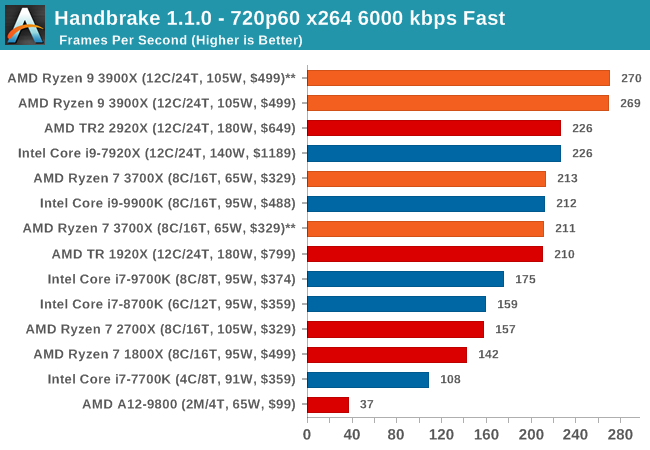
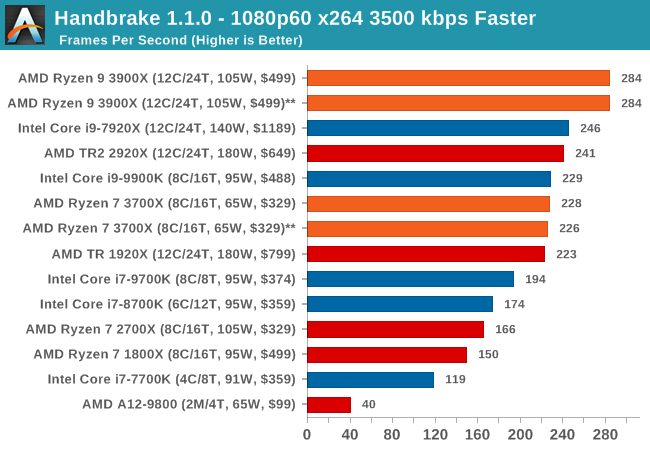
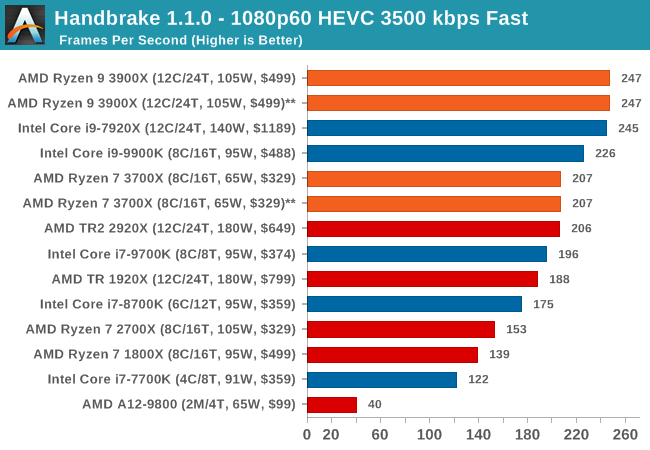
7-zip v1805: Popular Open-Source Encoding Engine
Out of our compression/decompression tool tests, 7-zip is the most requested and comes with a built-in benchmark. For our test suite, we’ve pulled the latest version of the software and we run the benchmark from the command line, reporting the compression, decompression, and a combined score.
It is noted in this benchmark that the latest multi-die processors have very bi-modal performance between compression and decompression, performing well in one and badly in the other. There are also discussions around how the Windows Scheduler is implementing every thread. As we get more results, it will be interesting to see how this plays out.
(Please note, if you plan to share the Compression graph, we'd appreciate it if you could please include the Decompression graph as well. Otherwise you’re only presenting half of the picture)
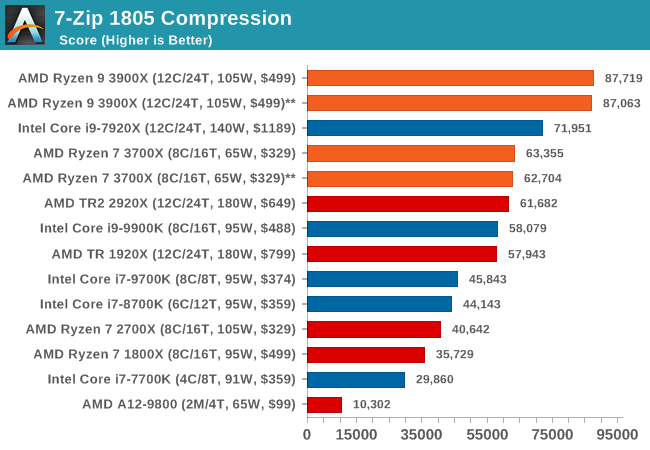
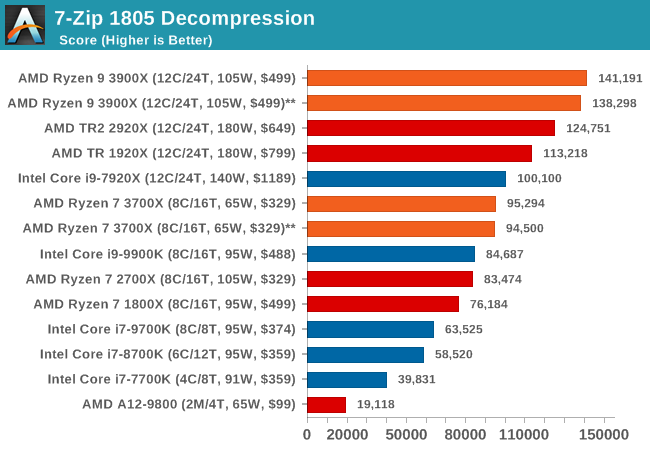
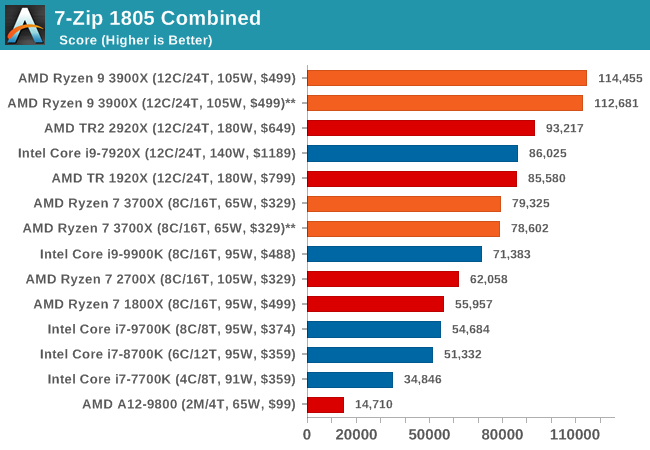
WinRAR 5.60b3: Archiving Tool
My compression tool of choice is often WinRAR, having been one of the first tools a number of my generation used over two decades ago. The interface has not changed much, although the integration with Windows right click commands is always a plus. It has no in-built test, so we run a compression over a set directory containing over thirty 60-second video files and 2000 small web-based files at a normal compression rate.
WinRAR is variable threaded but also susceptible to caching, so in our test we run it 10 times and take the average of the last five, leaving the test purely for raw CPU compute performance.
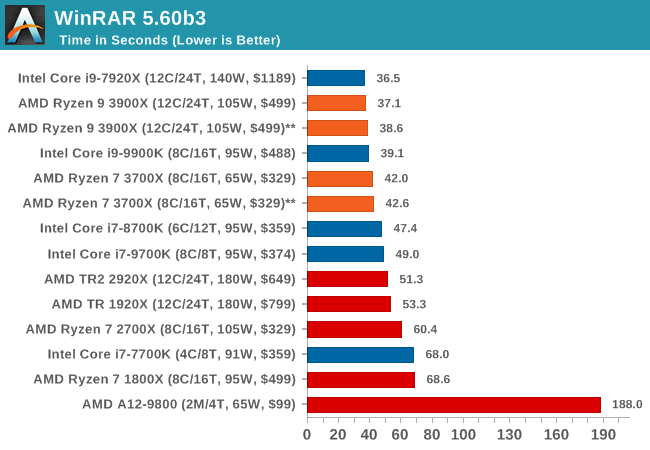
AES Encryption: File Security
A number of platforms, particularly mobile devices, are now offering encryption by default with file systems in order to protect the contents. Windows based devices have these options as well, often applied by BitLocker or third-party software. In our AES encryption test, we used the discontinued TrueCrypt for its built-in benchmark, which tests several encryption algorithms directly in memory.
The data we take for this test is the combined AES encrypt/decrypt performance, measured in gigabytes per second. The software does use AES commands for processors that offer hardware selection, however not AVX-512.
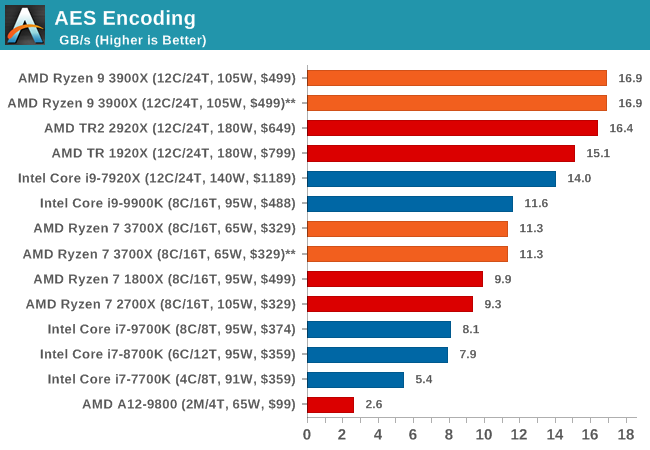










447 Comments
View All Comments
Irata - Monday, July 8, 2019 - link
Thanks for your reply Ryan. I did not intend to be rude when saying "lazy" but rather show that I do not think this is something that was done by intent.Like I said - mention these things and it helps clear up misunderstandings.
It is definitely very positive that you test the Ryzen CPU with the latest builds though.
I also like that you mention if prices include an HSF or not, but it would have been nice to mention the price of HSF used for Intel systems (when not boxed), as e.g. the Thermalright True Copper is a rather expensive CPU cooler.
I think you already addressed not using a faster nVME drive (a PCIe 4 version would have been ideal if available - this would also have given an indication of potentially increased system power use for the Ryzen with PCIe 4 drives) on Twitter.
Those are little nitpicks, so not intended to be a criticism of the overall article. It is just that people tend to be rather sensitive when it comes to Intel vs. AMD CPU comparisons, given Intel's history of things they are willing to do to keep mind- and marketshare.
Daeros - Monday, July 15, 2019 - link
Whether or not it is intentional, AT has had an increasing Intel bias over the last several years. Watch to see how long it takes for an AMD article to get pushed down by rumors or vaporware from Intel or Nvidia.rarson - Monday, July 8, 2019 - link
I think Ryan brings up several salient points, and whether or not you think that they did or did not have the time to do what you wanted (they were also a man down without Dr. Cuttress), the fact of the matter is that AMD dropped a bunch of CPUs and GPUs all at once and literally everyone was scrambling to do what they could in order to cover these launches.I don't think it's coincidence that even in the tech Youtube space, if you watch 10 different reviews you'll largely see 10 different testing methodologies and 10 (somewhat) different results. Every single reviewer I've talked to said that this was one of, if not the most, difficult launch windows they've ever dealt with. Additionally, launching on a weekend with all of its associated complications (not just on reviewers' ends, but partners as well) is a bitch, with everyone scrambling at the last minute on their days off getting in last-minute updates and whatnot.
When AMD tells you at the last minute, "Oh, the brand new Windows 10 update includes something new" you don't necessarily have time to go back and redo all the benchmarks you had already done on the Intel platform.
TL;DR while there may have been flaws in some of the testing, take the details with a grain of salt and compare them to the myriad of other reviews out there for a better overall picture if necessary.
Irata - Tuesday, July 9, 2019 - link
You are making a good point and unfortunately this was an - unfortunately - typical AMD CPU launch with things still being beta. I would assume testers are none too happy about having to re-do their tests.What I don't get from AMD (even if (and that's a capital IF) it's not their fault, it's their responsibility) is how they cannot see how this makes their products appear in a less favorable light. Let's say the buggy bios cost them 5%, the conclusion with a 5% better performance would have been even more in Ryzen 3000's favor.
It's a bit like showing up to a job interview wearing the clothes you wore for the previous day's physical activity.
Daeros - Monday, July 15, 2019 - link
Lazy isn't in it. Intentionally misleading is more like it. On one page, where AMD wins more than it looses in the charts, out of 21 paragraphs, 2 had something positive to say about AMD or Ryzen 3k without following up with something along the lines of "but we know Intel's got new tech coming, too"Ryan Smith - Monday, July 8, 2019 - link
To be sure, they're still valid. The patches for Fallout and ZombieLoad are not out yet (I only mention them because the vulnerabilities have already been announced).RSAUser - Monday, July 8, 2019 - link
They've been out since 14 May, what are you talking about?djayjp - Monday, July 8, 2019 - link
Don't forget RIDLMeteor2 - Sunday, July 14, 2019 - link
RIDL and Zombieload are the same thing.Yes, the Intel CPUs should have been re-benchmarked on 1903, updated after 14 May when the OS-side fixes for the new MDS-class flaws were released. That's only fair and it's quite reasonable to expect that users will apply security updates, not leave their systems unpatched and vulnerable for perhaps a percent or two of performance.
FireSnake - Monday, July 8, 2019 - link
Ryan: how is this not explained in the article? I am reading this site for more then a decade and I trust you most. and I trust you will provide such information. I would expect, you update the article with this info.